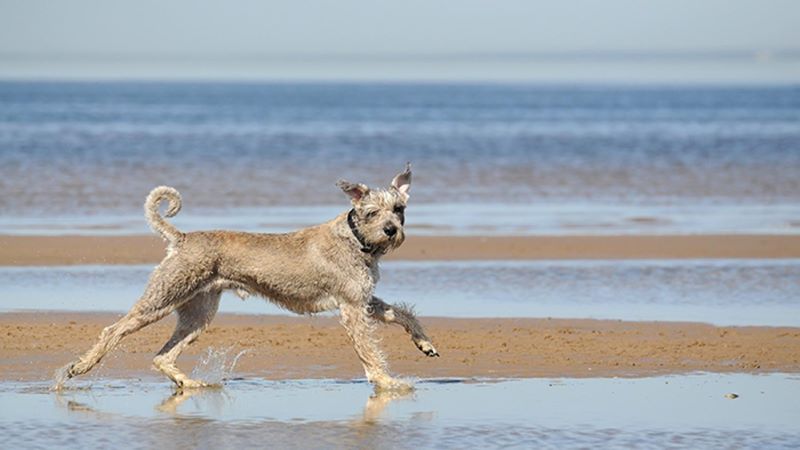Our dog doesn’t seem to have an off switch. She will chase a ball over and over again until she just keels right over. Which is why we have to remind our boys to watch her closely when they take her out for a game of fetch. Just because she’s happy to chase another ball doesn’t mean she should!
The same rules apply when enjoying a beach day with your dog. It is important to always keep your eye on your dog and to watch for warning signs before it’s too late. Just remember the following ABCDEs of Beach Safety and you’ll be smooth sailing this summer.
Avoid Heatstroke
It is important to avoid the beach during the hottest part of the day, which is usually between 10:00 am and 2:00 pm. A lot of beaches will help you out with this by allowing dogs on the beach only in the early morning and evening hours. When you are on the beach with your pup, give him time to rest, have a drink of cool, clean water, and get out of the sun.
Bring Your Own Water
Bring along a bottle of water and a cooler to keep it cold. My favorite way to transport water is in the Aqua Dog Travel Water Bowl. Offer the water to your dog often and do not allow him to drink from the ocean. Drinking salt water can dehydrate your pooch.
Cover Sensitive Areas
Use sunscreen and/or sunscreen wipes approved for use on pets. Zinc, which is in most human sunscreens, can be harmful to your dog. Make sure to apply to any part of your dog that is pink, his nose, ears, and places where his fur is thin. Rub lotion in thoroughly and give it time to sink in before heading to the beach. Consider using doggy sunwipes to reapply. One reviewer said she applied sunscreen on her jack russell before heading to the beach, and then used the wipes to refresh. She reported no sunburn at the end of the day! Avoid hot sand as well. Your dog’s pads can burn just as easily as his skin.
Don’t Forget Vaccinations
Stagnant water found around beaches can be a breeding ground for bacteria and parasites. Make sure your dog has had the vaccine for leptospirosis, as disease that can lead to kidney failure. Also, make sure your dog is up to date on his flea, tick, and heartworm prevention. PetPartners can help offset the cost of vaccines with their Wellness Plan. As Dr. Robert Trimble, co-founder and head of veterinary services at Fuzzy Pet Health in San Francisco says, “It only takes one mosquito to pass heartworm disease to your dog.”
Encourage Safe Swimming
It is a good idea to take your dog swimming in calm waters before introducing him to the tide and currents of the ocean. Make sure you observe the tide charts and avoid allowing your dog to swim when the currents are strong. You may also wish to use a flotation device. A dog life jacket with a float support to keep his head above the water and bright colors to make him easy to spot in the water can help to keep him safe.
If at any point in your day at the beach you notice excessive panting, lethargy, diarrhea, or vomiting, make sure you seek medical attention for your pooch. When it comes to being safe in the heat, it is always better to be safe than sorry! Enroll in pet insurance to be sure you can afford the best veterinary care should you dog find trouble this summer!

